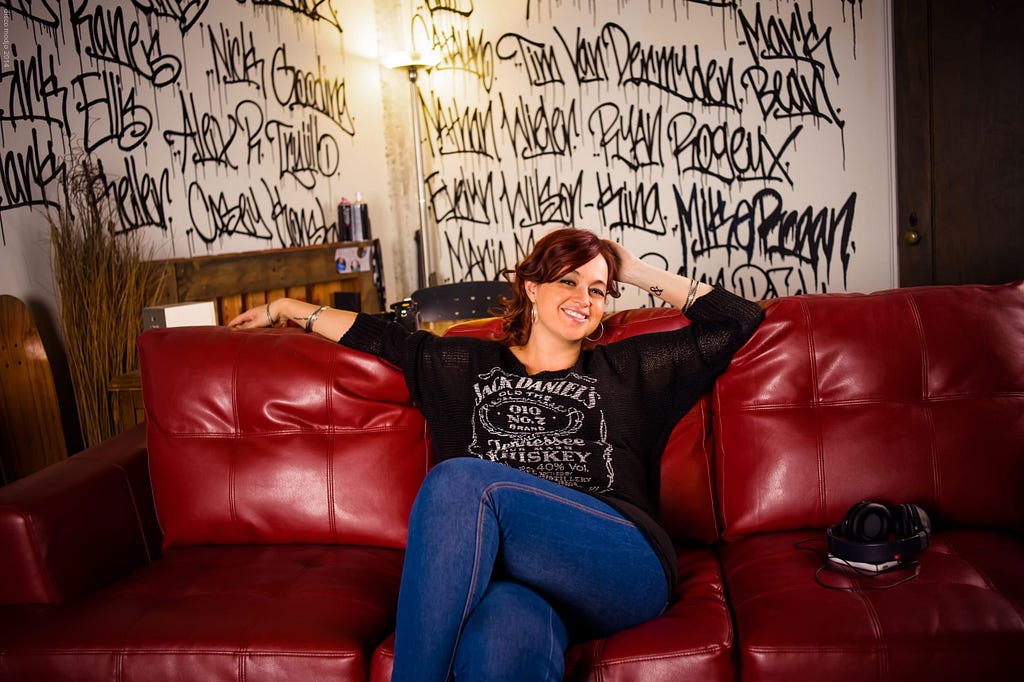“5 Things We Need To Do To Close The Gender Wage Gap”, with Ashley Porciuncula and Candice Georgiadis

Audit your pay structures and salaries often, to ensure that there is equal pay for equal value brought to the company. It’s easy to spot conscious discrimination and sexism, but unconscious bias is more difficult to pinpoint and can creep into an otherwise progressive team. Check the numbers and challenge the ones that don’t feel right. If you’re unsure if something is fair, it’s probably not.
As part of my series about “the five things we need to do to close the gender wage gap” I had the pleasure of interviewing Ashley Porciuncula, a technical consultant originally from San Francisco and living Bristol, England. She began her career in Silicon Valley in web design and coding, and has since travelled and lived all over the world, helping companies build digital products and development teams.
Thank you so much for joining us, Ashley! Can you tell us the “backstory” that brought you to this career path?
Thanks for having me! I had a keen interest in graphic design and coding as a teenager and started creating web pages for fun. By the time I was ready to start my career, I knew that tech was where I wanted to be, but I had a lot to learn. When I took my first development job for a San Francisco tech company, coding in a professional environment was entirely new to me. I sometimes wonder how I made it through those first few months! While I was there, I learned an enormous amount and was able to work my way up to become a Senior Developer before leaving to help co-found a digital department in Paris in the health industry. I spent several years building software there and eventually decided to go freelance in London so I could help more startups and technical teams.
Can you share the most interesting story that happened to you since you began this career?
There are a few projects that come to mind, like building a health tracking device from the ground up. It was my first physical product launch. There is so much to consider when developing a medical device from start-to-finish. The stakes are high when dealing with medications and health recommendations. It was fascinating to be so closely involved with the training of new algorithms. Plus, I’d never seen a dog on a treadmill before!
The thing that continually surprises me, though, is people. Every individual has unique motives, inspirations, fears. Building a team is a different experience every time, and requires putting one’s full head and heart into the process. Some of the most rewarding memories that I have are centred around mentoring and empowering others.
Can you share a story about the funniest or most interesting mistake you made when you were first starting? Can you tell us what lesson you learned from that?
Confession time! Before getting my first coding job, I had only worked on my own projects, with technology I had chosen and knew well. Standard development practices like committing code to a central location and setting up my machine to run code were foreign to me. I was so afraid to look stupid that I didn’t ask questions right away. I ended up making some silly mistakes and even wrote over someone else’s code by mistake. (Sorry, Meggie!) When I finally started asking more questions, everyone was friendly and willing to provide the help that I needed to succeed. I learned that even the most experienced developers have to Google sometimes. I wish I’d asked for help sooner. It would have saved me a lot of stress! People naturally want to see those around them succeed. If you need help, ask for it, and allow others the opportunity to be a part of your growth.

Ok, let’s jump to the main focus of our interview. Even in 2019, women still earn about 80 cents for every dollar a man makes. Can you explain three of the main factors that are causing the wage gap?
This is a topic that is very close to my heart, and I’m glad we’re talking about it.
In the home, women still carry out an overall average of 60% more unpaid work than men, such as housework, childcare, and caring for ageing parents. Of course, this means that we’re ending long days in the office with cooking and housework, leaving us less time to be well-rested for our day jobs. When there is a need to leave the office early for a doctors appointment or soccer practice, women are the ones asking for time off. I firmly believe that needing this kind of flexibility doesn’t hinder a person’s ability to handle a senior position, but a flexible mindset is something that companies are only now starting to adopt.
There is an enormous amount of work to do when it comes to changing deeply internalised prejudices held about women. Everyone holds these to an extent, even if we think we don’t. When we are confident, it’s seen as arrogance. When we are passionate, it’s translated as aggression. Our body language is scrutinised in ways that men aren’t. The old stereotype of the heartless female leader is alive and well in society, and it affects how our colleagues and managers view us.
These things leave us at a demonstrable disadvantage to male colleagues, resulting in only 22% of senior leadership roles being held by women, even though we make up 47% of the workforce. This disparity allows for the “bro culture” that we see so much of in tech. It means that sexist conversations, inappropriate joking, and outright discriminatory behaviour often go unchecked. Experiencing this type of culture can even lead to women giving up on tech altogether. We need more men to be allies, to speak up and say something to their colleagues when they observe these things.
Can you share with our readers what your work is doing to help close the gender wage gap?
Absolutely! As a management consultant, demonstrating the benefits of diversity in gender, race, and other characteristics is something about which I’m particularly passionate. Diverse teams build products and companies that speak to a diverse audience. Inclusion is, therefore, a necessity, not a luxury or a quota to meet.
I also like to do frequent Twitter giveaways of books, courses, and more to help women who might not otherwise have access to such resources. I’ve recently given away some “Make Your Ask” negotiation courses, seminar tickets, and copies of “Girls Who Code: Learn to Code and Change the World”.
Can you recommend five things that need to be done on a broader societal level to close the gender wage gap? Please share a story or example for each.
Offer family-oriented benefits equally to all parents, not just “mothers”. Be cautious about the language that you use around this. The best way to encourage equality is to normalise non-birthing parents taking on equal responsibility in the home. Build a company culture that views children and family as an asset, not as a challenge to be mitigated. Provide the parents in your organisation with a safe place to speak, then listen to them and enact their suggestions.
Consciously promote people who require flexible working. Observing promotions awarded to those who take time off for family responsibilities or prefer to work odd hours helps to create a culture where those with other responsibilities can freely ask for the time they need, without fear of negative consequences. The individuals in your organisation will take a piece of that culture wherever they go next.
Have a zero-tolerance policy for sexual harassment and “locker room talk”. Over 50% of women have experienced harassment in the workplace, but the fear of repercussions if they report this behaviour is overwhelming for many. Creating a culture where women feel safe to speak up will help reduce these instances, and ensure that they don’t go unreported. By doing this, you decrease employee turnover related to an uncomfortable work environment and mitigate any possible pay-related consequences that come when women are forced to switch jobs.
Audit your pay structures and salaries often, to ensure that there is equal pay for equal value brought to the company. It’s easy to spot conscious discrimination and sexism, but unconscious bias is more difficult to pinpoint and can creep into an otherwise progressive team. Check the numbers and challenge the ones that don’t feel right. If you’re unsure if something is fair, it’s probably not.
Finally, recognise that the gender gap and other forms of discrimination affect women of colour to a greater extent. Speak to your employees of colour about their experiences, ask if they feel supported, and be willing to make changes.
You are a person of great influence. If you could inspire a movement that would bring the most amount of good to the most amount of people, what would that be? You never know what your idea can trigger. 🙂
Something centred around developing more empathy. The lack of it is the root cause of so many things plaguing us today, as a society and a planet. We need compassion for those who are less fortunate. We need to help fellow humans in need, regardless of where they were born. We urgently need to commit ourselves to protect future generations who will be stuck with the planet we leave them. To truly love other humans is such a healthy thing. If we all developed empathy for each other, it would quite literally save the world.
Can you please give us your favorite “Life Lesson Quote”? Can you share how that was relevant to you in your life?
“A ship in harbour is safe, but that is not what ships are built for.”
When I first moved to Paris, I was terrified and miserable. I wanted to run back home after my first week, but I knew that would start me down a path of running back every time I was pushed outside of my comfort zone. I ended up staying for over three years. I realised that I am my own constant. Since then, I’ve started fresh numerous times, always excited for the adventure ahead, knowing that I can handle whatever comes my way. Every one of us has that strength. It needs to be challenged to awaken, but when it does, it has the power to change your entire life path.

We are very blessed that some of the biggest names in Business, VC funding, Sports, and Entertainment read this column. Is there a person in the world, or in the US whom you would love to have a private breakfast or lunch with, and why? He or she might see this, especially if we tag them. 🙂
There are so many spectacular people that I would give an arm and leg for some time with them. If I had to choose one, it would have to be Tina Fey. She’s such a great example of powering through and making your own success. She doesn’t stop, and that energy is something that I find exhilarating. I think I could listen to her talk about filing her taxes and still come out of it inspired to be a better and more powerful version of myself.
This was really meaningful! Thank you so much for your time.
Thank you!
“5 Things We Need To Do To Close The Gender Wage Gap”, with Ashley Porciuncula and Candice… was originally published in Authority Magazine on Medium, where people are continuing the conversation by highlighting and responding to this story.

